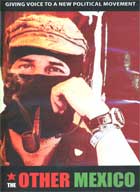
The Other Mexico 2008
Distributed by Choices, Inc., 3740 Overland Ave., Ste. F, Los Angeles CA 90034; (310) 839-1500
Produced by Francesco Nava
Directed by Francesco Nava
DVD, color, 50 min.
Sr. High - Adult
Economics, Human Rights, Political Science, Postcolonialism, South American Studies
Date Entered: 08/20/2009
Reviewed by Jane Sloan, Rutgers University LibrariesThe Other Mexico chronicles the 2006 campaign of the Zapatistas to shape the Mexican political process from outside the political system. Dubbed the “Other Campaign,” it sent ‘Subcomandante Marcos’ on a tour of most of the country’s states to meet with union leaders, workers, teachers, academics, and activists from all kinds of civilian social movements. The goal of the tour is to ‘listen’ to all the people, especially the over 50% of impoverished Mexicans, and encourage unity among them. The effort is “non-electoral;” though solicited as a political candidate, Marcos is clear he is not running for office as he considers any “national plan” to be an appeal to the elite, no matter what their political party affiliation. The film provides an appropriate amount of background on the long standing group, its founding in an uprising suppressed by the military, and subsequent pursuit of non-violent tactics since the 1990s. Other background is provided on Marcos, the masked (in a balaclava) charismatic speaker of the movement originally focused on the rights of indigenous peoples. But the majority of the film is coverage of live events, speeches, and interviews with people on the trail of the tour—journalists, academics, activists, people on the streets, and one of the Zapatistas. All viewpoints, excepting the government’s, are represented, including people’s fears of the Zapatistas as a “closed sect.” Marcos is admired for his use of colloquial language, ability to listen, and elision of his personal (facial) characteristics. The movement, especially in its 2006 incarnation as a unity-building non-electoral kind of politics, is described as a modern political movement cognoscente of the reality of globalization. As it meets up with other peaceful protests, such as a teachers strike, the response from the government turns violent. The film is intelligently organized around the subjects’ words, very well shot and edited, with interesting quotation-like framing of the small amount of video acquired from news and other sources. Recommended highly for collections focused on current events or politics.